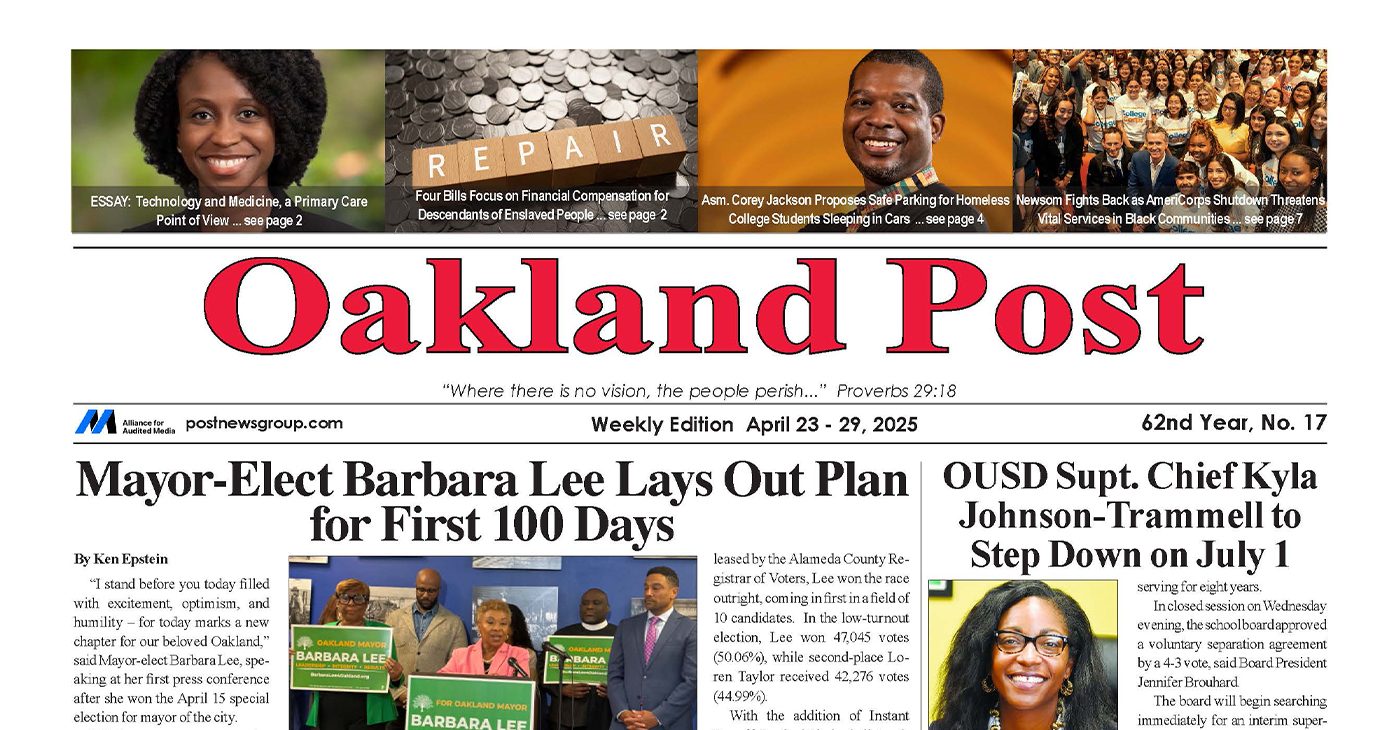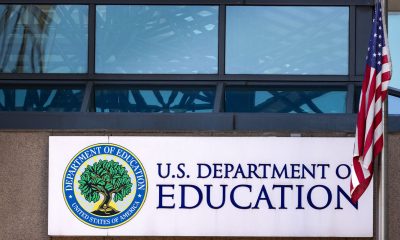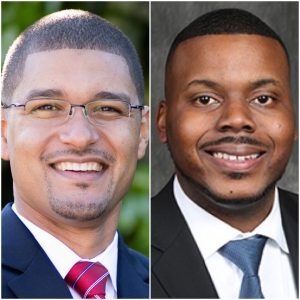Community
Black Men Challenge Narratives About Black Fatherhood
WASHINGTON INFORMER — As Father’s Day approaches, the conversation among some Black fathers in the District has focused on how best to counter the barrage of messages that frame them as negligent, despite recent data that proves otherwise. In the spirit of meeting that goal, upcoming community gatherings will serve as celebratory platforms to examine the social and emotional hurdles that many Black men have overcome in becoming a permanent fixture in their families.
By Sam P. K. Collins
As Father’s Day approaches, the conversation among some Black fathers in the District has focused on how best to counter the barrage of messages that frame them as negligent, despite recent data that proves otherwise.
In the spirit of meeting that goal, upcoming community gatherings will serve as celebratory platforms to examine the social and emotional hurdles that many Black men have overcome in becoming a permanent fixture in their families.
For one such father, Antonio Beard, providing an example for his 5-year-old son and three older stepchildren has been his greatest achievement.
“I couldn’t allow what was happening with my son’s mother affect my situation with him,” said Beard, a Ward 7 resident and co-founder of the Lead by Example Foundation, co-sponsor of a Father’s Day Sip-and-Paint event taking place on Saturday afternoon at Fort Dupont Stoddert Community Center in Southeast, courtesy of ANC Commissioner Brittany Hughes (SMD 7F05). “Sometimes you both might not be the best fit, but your child should be your main focus.”
Beard said the pain of not having his father around compelled him to instill good values in and share special moments with his children, including morning pep talks, baseball games and trips to his job.
“One thing I learned is that you’re good as long as you spend time,” he said. ” It’s challenging, but something I like to do.”
Beard and other local fathers fit the profile of Black men highlighted in a 2013 study by the Centers for Disease Control and Prevention showing members of that demographic, whether in a nuclear family or as a co-parent, having more of a presence in the lives of their young ones, compared to their racial counterparts.
On Sunday, some of these fathers, stepfathers and grandfathers plan to take over the U Street corridor in a march against negative stereotypes during an event hosted by Kristi Love Events, DCity Smokehouse and We Act Radio.
Community advocates say that fallacies about Black male parenting often stem from a misunderstanding of social structures within Black communities that have been precipitated by mass incarceration. For instance, data shows that while 1.7 million Black men don’t live with their children, nearly 2.5 million Black men share the same address as their offspring, often cohabitating with their unmarried partner in what’s been called “shotgun pregnancies.”
During the last decade, that type of living arrangement surpassed shotgun marriages, according to data from the National Center for Health Statistics. In many cases, co-parents don’t legally marry, often making the term “single mother” synonymous with absent father, when that might not even be the case.
Since the turn of the century, organizations in the D.C. metropolitan area such as The 100 Fathers Inc. have taken the mantle in celebrating fathers, and connecting upstanding Black men with children lacking a positive male presence.
Upcoming events such as the Fatherhood Legislative Summit at the Mayors Conference Center in Northwest on Friday, a field day at the Marvin Gaye Recreation Center on Saturday, and an award ceremony at Union Temple Baptist Church on Sunday build upon The 100 Fathers Inc.’s previous collaborations with the Nation of Islam and Alliance of Concerned Men to engage fatherless youth and show new fathers how to lead their home.
“Because we often didn’t advocate for ourselves, we had to take whatever was given to us as far as the societal look on fathers and Black men,” Franklyn Malone, CEO and president of The 100 Fathers, Inc., said in his indictment of governmental and nonprofit organizations he said haven’t straightened the record about Black fathers.
“People don’t know the real facts about Black fathers, or provided spaces or them to flourish,” said Malone, a father of four. “When you go on the Department of Health website, you don’t see fathers. We are part of the families. There’s very little mention of the father and that’s the problem.
“The family unit is the most important for the Black family,” he said. “We need to work together to save our children.”
For some Black fathers, saving their children and families requires a level of emotional availability they’ve been conditioned to suppress. Relationship experts say unresolved childhood trauma and misleading messages from family members, peers and family members about how to express Black masculinity hinders some Black men’s ability to form healthy, open relationships.
During its “Men Hurt Too Conference: Celebrating Men Survivor Stories” event, scheduled to take place Saturday afternoon at the Deanwood Community Center in Northeast, local nonprofit Domestic Violence Wear Many Tags (DVWMT) will feature Black men who overcame the shame of victimhood in abusive relationships with their mothers and significant others.
DVWMT founder QueenAfi said the event, part of Men’s Mental Health Awareness Month, will aid in attempts to broaden the conversation about domestic violence and allow Black men to share their feelings without pushback.
“A lot of men don’t know how to show their emotions,” QueenAfi said. “When they do, it comes off in a way that the other person might not understand. We have to start providing men a place to share their feelings. It’s something they truly need to be emotionally well. They must be able to share in a safe space without feeling judged.”
This article originally appeared in the Washington Informer.
Activism
Oakland Post: Week of April 23 – 29, 2025
The printed Weekly Edition of the Oakland Post: Week of April 23 – 29, 2025

To enlarge your view of this issue, use the slider, magnifying glass icon or full page icon in the lower right corner of the browser window.
#NNPA BlackPress
Chavis and Bryant Lead Charge as Target Boycott Grows
BLACKPRESSUSA NEWSWIRE — Surrounded by civil rights leaders, economists, educators, and activists, Bryant declared the Black community’s power to hold corporations accountable for broken promises.

By Stacy M. Brown
BlackPressUSA.com Senior National Correspondent
Calling for continued economic action and community solidarity, Dr. Jamal H. Bryant launched the second phase of the national boycott against retail giant Target this week at New Birth Missionary Baptist Church in Atlanta. Surrounded by civil rights leaders, economists, educators, and activists, Bryant declared the Black community’s power to hold corporations accountable for broken promises. “They said they were going to invest in Black communities. They said it — not us,” Bryant told the packed sanctuary. “Now they want to break those promises quietly. That ends tonight.” The town hall marked the conclusion of Bryant’s 40-day “Target fast,” initiated on March 3 after Target pulled back its Diversity, Equity, and Inclusion (DEI) commitments. Among those was a public pledge to spend $2 billion with Black-owned businesses by 2025—a pledge Bryant said was made voluntarily in the wake of George Floyd’s murder in 2020.“No company would dare do to the Jewish or Asian communities what they’ve done to us,” Bryant said. “They think they can get away with it. But not this time.”
The evening featured voices from national movements, including civil rights icon and National Newspaper Publishers Association (NNPA) President & CEO Dr. Benjamin F. Chavis Jr., who reinforced the need for sustained consciousness and collective media engagement. The NNPA is the trade association of the 250 African American newspapers and media companies known as The Black Press of America. “On the front page of all of our papers this week will be the announcement that the boycott continues all over the United States,” said Chavis. “I would hope that everyone would subscribe to a Black newspaper, a Black-owned newspaper, subscribe to an economic development program — because the consciousness that we need has to be constantly fed.” Chavis warned against the bombardment of negativity and urged the community to stay engaged beyond single events. “You can come to an event and get that consciousness and then lose it tomorrow,” he said. “We’re bombarded with all of the disgust and hopelessness. But I believe that starting tonight, going forward, we should be more conscious about how we help one another.”
He added, “We can attain and gain a lot more ground even during this period if we turn to each other rather than turning on each other.” Other speakers included Tamika Mallory, Dr. David Johns, Dr. Rashad Richey, educator Dr. Karri Bryant, and U.S. Black Chambers President Ron Busby. Each speaker echoed Bryant’s demand that economic protests be paired with reinvestment in Black businesses and communities. “We are the moral consciousness of this country,” Bryant said. “When we move, the whole nation moves.” Sixteen-year-old William Moore Jr., the youngest attendee, captured the crowd with a challenge to reach younger generations through social media and direct engagement. “If we want to grow this movement, we have to push this narrative in a way that connects,” he said.
Dr. Johns stressed reclaiming cultural identity and resisting systems designed to keep communities uninformed and divided. “We don’t need validation from corporations. We need to teach our children who they are and support each other with love,” he said. Busby directed attendees to platforms like ByBlack.us, a digital directory of over 150,000 Black-owned businesses, encouraging them to shift their dollars from corporations like Target to Black enterprises. Bryant closed by urging the audience to register at targetfast.org, which will soon be renamed to reflect the expanding boycott movement. “They played on our sympathies in 2020. But now we know better,” Bryant said. “And now, we move.”
#NNPA BlackPress
The Department of Education is Collecting Delinquent Student Loan Debt
BLACKPRESSUSA NEWSWIRE — the Department of Education will withhold money from tax refunds and Social Security benefits, garnish federal employee wages, and withhold federal pensions from people who have defaulted on their student loan debt.

By April Ryan
Trump Targets Wages for Forgiven Student Debt
The Department of Education, which the Trump administration is working to abolish, will now serve as the collection agency for delinquent student loan debt for 5.3 million people who the administration says are delinquent and owe at least a year’s worth of student loan payments. “It is a liability to taxpayers,” says White House Press Secretary Karoline Leavitt at Tuesday’s White House Press briefing. She also emphasized the student loan federal government portfolio is “worth nearly $1.6 trillion.” The Trump administration says borrowers must repay their loans, and those in “default will face involuntary collections.” Next month, the Department of Education will withhold money from tax refunds and Social Security benefits, garnish federal employee wages, and withhold federal pensions from people who have defaulted on their student loan debt. Leavitt says “we can not “kick the can down the road” any longer.”
Much of this delinquent debt is said to have resulted from the grace period the Biden administration gave for student loan repayment. The grace period initially was set for 12 months but extended into three years, ending September 30, 2024. The Trump administration will begin collecting the delinquent payments starting May 5. Dr. Walter M. Kimbrough, president of Talladega College, told Black Press USA, “We can have that conversation about people paying their loans as long as we talk about the broader income inequality. Put everything on the table, put it on the table, and we can have a conversation.” Kimbrough asserts, “The big picture is that Black people have a fraction of wealth of white so you’re… already starting with a gap and then when you look at higher education, for example, no one talks about Black G.I.’s that didn’t get the G.I. Bill. A lot of people go to school and build wealth for their family…Black people have a fraction of wealth, so you already start with a wide gap.”
According to the Education Data Initiative, https://educationdata.org/average-time-to-repay-student-loans It takes the average borrower 20 years to pay their student loan debt. It also highlights how some professional graduates take over 45 years to repay student loans. A high-profile example of the timeline of student loan repayment is the former president and former First Lady Barack and Michelle Obama, who paid off their student loans by 2005 while in their 40s. On a related note, then-president Joe Biden spent much time haggling with progressives and Democratic leaders like Senators Elizabeth Warren and Chuck Schumer on Capitol Hill about whether and how student loan forgiveness would even happen.
-

 Activism4 weeks ago
Activism4 weeks agoOakland Post Endorses Barbara Lee
-

 Activism4 weeks ago
Activism4 weeks agoOakland Post: Week of March 28 – April 1, 2025
-

 Activism3 weeks ago
Activism3 weeks agoOakland Post: Week of April 2 – 8, 2025
-

 #NNPA BlackPress3 weeks ago
#NNPA BlackPress3 weeks agoTrump Profits, Black America Pays the Price
-

 Activism2 weeks ago
Activism2 weeks agoOakland Post: Week of April 9 – 15, 2025
-

 #NNPA BlackPress3 weeks ago
#NNPA BlackPress3 weeks agoHarriet Tubman Scrubbed; DEI Dismantled
-

 #NNPA BlackPress3 weeks ago
#NNPA BlackPress3 weeks agoLawmakers Greenlight Reparations Study for Descendants of Enslaved Marylanders
-

 #NNPA BlackPress3 weeks ago
#NNPA BlackPress3 weeks agoTrump Targets a Slavery Removal from the National Museum of African-American History and Culture






















































